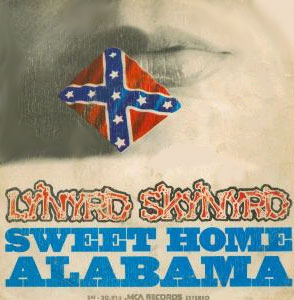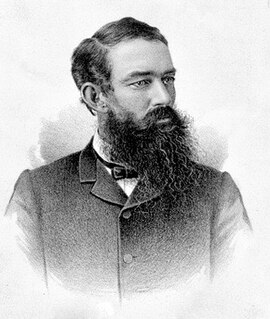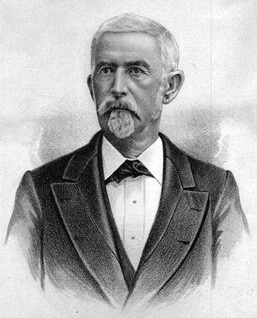
George Corley Wallace Jr. was the 45th Governor of Alabama, a position he occupied for four terms, during which he promoted "low-grade industrial development, low taxes, and trade schools". He sought the United States presidency as a Democrat three times, and once as an American Independent Party candidate, unsuccessfully each time. He is best remembered for his staunch segregationist and populist views. Wallace was known as "the most dangerous racist in America" and notoriously opposed desegregation and supported the policies of "Jim Crow" during the Civil Rights Movement, declaring in his 1963 inaugural address that he stood for "segregation now, segregation tomorrow, segregation forever".

George Chauncey Sparks, known as Chauncey Sparks, was an attorney and Democratic American politician who served as the 41st Governor of Alabama from 1943 to 1947. He made improvements to state education of whites and expanded the state schools and centers for agriculture. He campaigned for passage of the Boswell Amendment to the state constitution, which was designed to keep blacks disfranchised following the US Supreme Court ruling Smith v. Allwright (1944) against use of white primaries by the Democratic Party in the states.

Benjamin Meek Miller was an American Democratic politician who served as the 39th Governor of Alabama from 1931 to 1935. The Scottsboro Boys affair notably took place during his gubernatorial tenure.

Thomas Goode Jones was an American Democratic politician who was the 28th Governor of Alabama from 1890 to 1894. Born in 1844 in Macon, Georgia and died in 1914 in Montgomery, Alabama.

David P. Lewis was an American politician who served as the 23rd Governor of Alabama from 1872 to 1874. He was also a Deputy from Alabama to the Provisional Congress of the Confederate States, serving from February until April 1861, when he resigned from office.

"Sweet Home Alabama" is a song by Southern rock band Lynyrd Skynyrd that first appeared in 1974 on their second album, Second Helping.

The Alabama gubernatorial election of 2006 occurred on November 7, 2006. Incumbent Republican Bob Riley defeated Democratic Lieutenant Governor Lucy Baxley. Riley garnered 21% of African Americans' votes.

The Great Seal of the State of Alabama is the state seal of the U.S. state of Alabama.

The government of Alabama is organized under the provisions of the 1901 Constitution of Alabama, the lengthiest constitution of any political entity in the world. Like other states within the United States, Alabama's government is divided into executive, judicial, and legislative branches.

Thomas Seay was an American Democratic politician who was the 27th Governor of Alabama from 1886 to 1890.

The Alabama gubernatorial election of 1998 was held on 3 November 1998 to select the Governor of Alabama. The election saw incumbent Governor Fob James (R) against Lieutenant Governor Don Siegelman (D). The result saw Don Siegelman win a decisive victory over Fob James. As of 2019, this is the most recent election in which a Democrat was elected Governor of Alabama.

Kay Ellen Ivey is an American politician serving as the 54th Governor of Alabama since 2017. A member of the Republican Party, she previously was the 38th Alabama State Treasurer from 2003 to 2011 and 30th Lieutenant Governor of Alabama from 2011 to 2017. Ivey became Alabama's second female governor and first female Republican governor upon the resignation of her predecessor, Robert J. Bentley. She won a full term in the 2018 gubernatorial election.

The 2010 Alabama gubernatorial election took place on November 2, 2010. Republican Governor Bob Riley was term limited and unable to seek re-election. The party primaries were held on June 1, 2010, with a Republican runoff on July 13. In the general election, Republican Robert J. Bentley defeated Democrat Ron Sparks.

The 2014 Alabama gubernatorial election took place on November 4, 2014, to elect the Governor of Alabama.

The 2018 Alabama gubernatorial election took place on November 6, 2018, to elect the Governor of Alabama. Incumbent Republican Governor Kay Ivey, who took office on April 10, 2017, upon the resignation of Governor Robert Bentley, ran for election to a full term and won over Tuscaloosa mayor Walt Maddox. Ivey will be sworn into office on January 14, 2019. This is the first gubernatorial election since 2002 in which a Democrat won Tuscaloosa County and the first since 1990 in which neighboring Pickens County voted for a different candidate than Tuscaloosa.

A general election was held in the U.S. state of Alabama on November 6, 2018. All Alabama executive officers were up for election along with all of Alabama's seven seats in the United States House of Representatives. Primary elections took place on June 5, 2018, for both major parties.

The 1888 United States presidential election in Alabama was held on November 6, 1888, as part of the concurrent Presidential election in which all thirty-eight contemporary states participated. Alabama voters chose ten electors, or representatives to the Electoral College, who voted for President and Vice-President.

The 1884 United States presidential election in Alabama took place on November 4, 1884, as part of the 1884 United States presidential election. Alabama voters chose ten representatives, or electors, to the Electoral College, who voted for president and vice president.
















